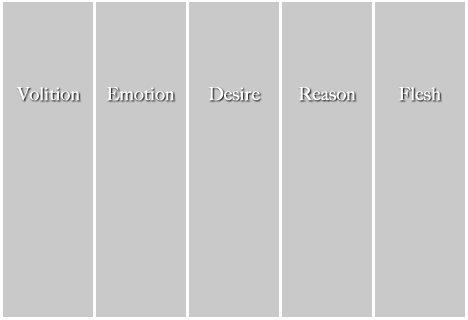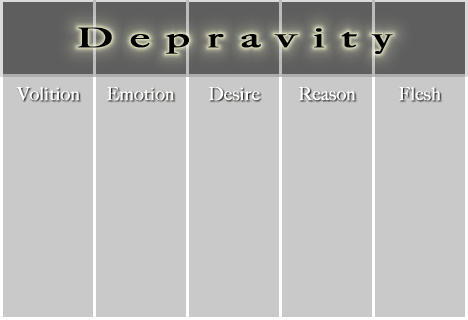I’ve taken quite a hiatus from my writing on total depravity. In talking to some friends, various objections were brought up concerning where I was taking the logic train. Before I can state the problem, I need to state some background.
I have been taught the think-right, want-right, do-right, feel-right “train” of human motivation and action. We do what we do because we want what we want. (If we want chocolate, we eat it. If we want to lose weight more than we want chocolate, we don’t eat the chocolate.) What we do determines how we feel. (We do a bad thing, or just a thing that we believe is bad, and we feel bad.) Feelings, then, are the “caboose” of the train. We don’t need to worry about fixing feelings so much. They’re symptoms, not conditions. If we are depressed, chances are, it’s because something further up the train has derailed. We should fix that problem, and the depression fixes itself. Emotions are like a thermometer on the human persona. (I’m using depression as a quick example here. Please, no comments on the legitimacy of medical causes. I’m not arguing that there are no biological causes for depression.)
At the very front of this train is the “thought locomotive.” We think a certain way about chocolate. This causes us to want it or not. This causes us to eat it or not. This causes us to feel good or not. Think, want, do, feel.
So in a counseling situation, the first thing that we focus on is the thought process that’s going on. If someone is sitting around all day long, with nothing to do, and is thinking, “Woe is me; I have no friends,” then of course they’ll feel depressed. But the key isn’t medication. It’s to find ways to change the underlying condition. Get them out of the house. Get them thinking different thoughts. Get them focused on activities where they see nice people. Use practical tools (like, make them write a list of 10 things people have done in the past week that showed care for me) to change what thoughts the person is thinking. True thoughts will lead to wanting good things, which leads to right decisions which leads to happiness.
This is very much an oversimplification. And I haven’t mentioned where the Gospel fits into this paradigm at all. But generally speaking, I buy this idea of how the human works. I think this is an excellent counseling paradigm. But this is really a super-simplification of a complex human process that looks somewhat difference. This works beautifully in counseling, but for theological purposes, it’s just a but shallow.
Primarily, I think that this model makes too great a distinction between doing and thinking. A thinking is a doing. We often choose what to think. Now, it’s true, when someone says, “Don’t think about a pink elephant!” we all think about a pink elephant. But generally speaking, thinking isn’t purely involuntary. Sometimes, based on visual stimulus, it can be very easy to begin thinking lustful thoughts, for example, but hopefully we make a choice to excise those thoughts and fill that thought-space with something else (like pink elephants). For a moment, when a less than perfectly dressed female crosses my path, it’s almost as if my mind is hijacked, just for a split second, but immediately comes a point of decision where I can choose what thought to think next. On the basis of what will I choose my next thought? I will choose what I want. If I want to honor God, I will notice how blue the sky is and how rather fluffy the clouds are today. If I want to lust, I will choose a very different train of thought.
So, thinking is a doing. At some point in our thinking, we have an opportunity to think one thought or to think another thought. Therefore, thinking not only affects wanting, but wanting also affects thinking.
This is almost completely useless in the counseling room. I have no way to reach inside your head and change your wants. But I can give a homework assignment that almost (but not really) forces you to think thankful thoughts. (Write 50 reasons why you are thankful for your spouse.) The knowledge of the feedback cycle of wanting and thinking isn’t very helpful to the counselor. The counselor seeks to get a handle on the train at some point so he can start re-railing the cars. The best handle is at the thinking car of the train (and, to some degree, the doing car). But thinking really is a sub-genre of doing.
To state that the root of the human problem is thinking untrue thoughts is at best an over-simplification and at worst grossly mistaken. The solution to the human problem, then, is not purely or even primarily correcting our thoughts of God and self. (Ooh, radical statement. I may need to revise this in the future…)
I hold that the root of the problem is the “wanting” car. Wanting, though part of the thinking-wanting feedback cycle, is causally prior and more important than the “thinking” car. In Romans 1 we read that truths about God were obvious, that, in fact, there was some sense in which people knew God but refused to acknowledge Him. This is like me, confronted with immodesty: I can refuse to acknowledge it and choose to think of something other than what is right in front of me, but that choice in no way results from epistemic inaccessibility or ignorance. So, too, the choice of the Romans 1 reprobate does not simply reflect a problem in the “thinking.” Sure, the thoughts were wrong, and obviously so, but the wrongness of the thoughts resulted directly from thought-choices driven by the affection, the “wanting” part of the mind. The problem with the reprobate is that he wants to think a certain way.
The desires or the affections are the root of the problem. Thence flows the corruption of depravity to every other part of the human being. We want bad things, so we think bad things, those two together mean that we do bad things, so we feel bad. Regeneration does involve a change in thinking, but it is fundamentally a change in wanting (which causes a change in thinking).
Next I should write a post attempting to support that view from more than one passage…


